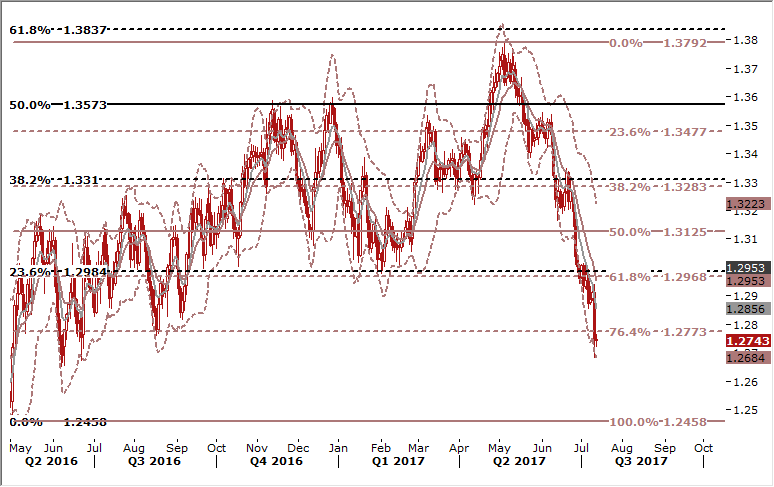EUR/USD: Market attention turns to U.S. CPI, stay short for 1.1290
Macroeconomic overview: The Fed "continues to expect that the evolution of the economy will warrant gradual increases in the federal funds rate over time," Fed Chair Janet Yellen said in her prepared testimony before Congress. Reductions in the Fed's portfolio of more than USD 4 trillion in securities are likely to begin "this year," she said.
But she also noted that given current estimates, the federal funds rate "would not have to rise all that much further" to reach a neutral level that neither encourages nor discourages economic activity. The Fed still feels the economy needs loose, or accommodative, monetary policy, so a lower neutral rate means the Fed may feel compelled to slow the pace of rate hikes down the road.
But for now, Yellen told members of the House Committee on Financial Services, the economy remains strong enough for the Fed to continue to gradually tighten policy. In response to questions from lawmakers, she said she expects the gradual run down of the balance sheet will "play out smoothly" in markets.
The reduction in the balance sheet, which will begin slowly as the Fed reinvests only a portion of the holdings that mature each month, will mark the final exit from crisis-related policies.
A recent dip in inflation has been of concern among Fed officials who want to see surer progress toward the central bank's 2% inflation goal. Yellen, however, ascribed it to "a few unusual reductions in certain categories of prices" that would eventually drop out of the calculation.
U.S. stocks rose, while yields on Treasury bonds fell and the dollar was little changed against a basket of currencies.
In a separate release, the Fed's latest beige book of reports from regional Fed banks showed "slight to moderate" economic growth across the country.
Market attention turns to U.S. inflation data now and its potential impact on Fed policy. U.S. CPI numbers are due on Friday and the market expects the June core CPI figure to have risen 0.2% mom, from a gain of 0.1% mom the previous month. We think that a reading in line with expectations would support the USD.
Technical analysis: We stay short at 1.1450. Wednesday’s price action was encouraging, after setting a new trend high the pair closed down. We are looking now to close below 7-day exponential moving average (currently at 1.1405). 23.6% fibo of June rise at 1.1402 is also an important support level.
Short-term signal: Short for 1.1290.
Long-term outlook: Bullish
USD/CAD: BoC raised rates, as expected. Upbeat statement suggests further tightening.
Macroeconomic overview: The Bank of Canada raised interest rates for the first time in nearly seven years on Wednesday, saying the economy no longer needed as much stimulus and sending the Canadian dollar to a near 11-month high on expectations of more rate hikes to come.
The widely expected rate increase makes Canada the first major central bank to follow the Federal Reserve in removing some of the monetary stimulus poured into the global economy after the 2007-2009 financial crisis.
In our opinion the central bank's statement suggested at least one more quarter-percentage point rate increase is in store for 2017, with more likely to follow gradually if growth continues to meet expectations.
The central bank cited a need to look through soft inflation as it hiked rates for the first time since September 2010 but said it will wait for more economic data before committing to its next move.
Bank of Canada Governor Stephen Poloz said at a news conference:
There is an upward revision to our outlook of course because of the data, but more importantly it's our confidence that has increased through those months compared to where we were at the beginning of the year. It's that confidence in the outlook that makes us more confident today, to make the change we've made.
The increase, which pushed the official interest rate up to a still-low 0.75%, boosted the Canadian dollar to a near 11-month high and sent yields on Canada's two-year bonds to their highest since September 2014.
Years of ultra-low interest rates since the financial crisis spurred a borrowing binge and helped drive Canadian household debt to record levels in recent years, fueling a housing boom that has recently began to falter.
The bank said in its accompanying monetary policy report that activity in the housing sector has abated, largely due to sharp declines in resales in Toronto and surrounding areas.
The central bank has repeatedly warned about the vulnerabilities posed by the massive consumer debt but was forced to cut interest rates twice in 2015 as oil prices dropped, sideswiping Canada's energy-dependent economy.
In a decision that emphasized the lag between a rate hike and future inflation, the bank signaled it did not want to commit to a predetermined path of more hikes.
Technical analysis: The USD/CAD traded down to 1.2681, fresh cycle low and 13-month low. Daily RSI is at 3-year low and weekly RSI is at 6-year low. The USD/CAD broke below 76.4% retracement of May 2016-May 2017 rise and is on the way to full retracement (1.2458). 
Short-term signal: Although BoC decision was widely expected, we have not seen any profit taking on USD/CAD selling positions. Long-term outlook remains bearish and short-term strategy is to sell on upticks. Our sell offer is now at 1.2940.
Long-term outlook: Bearish
Source: GrowthAces.com - your daily forex signals newsletter
